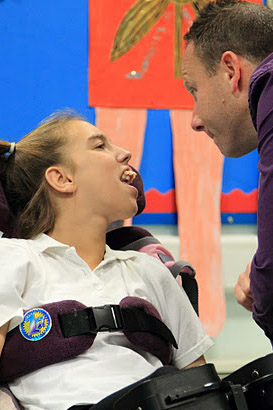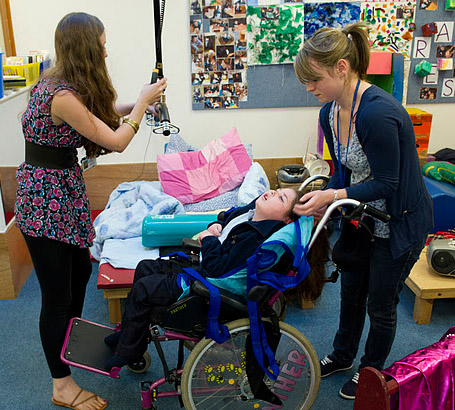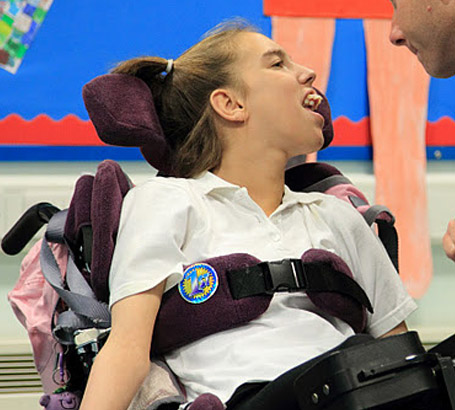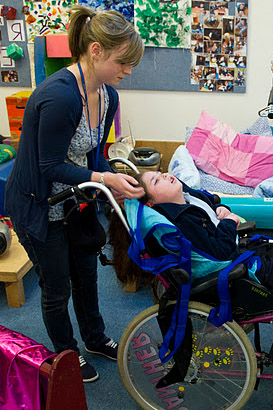
Palliative care aims to support children
with life-limiting conditions and their families to maintain quality of life.
Department of Health and Children, 2009
The World Health Organisation definition of palliative care for children:
- Palliative care for children is the active total care of the child's body, mind and spirit, and also involves giving support to the family.
- It begins when illness is diagnosed, and continues regardless of whether or not a child receives treatment directed at the disease.
- Health providers must evaluate and alleviate a child's physical, psychological, and social distress.
- Effective palliative care requires a broad interdisciplinary approach that includes the family and makes use of available community resources; it can be successfully implemented even if resources are limited.
- It can be provided in tertiary care facilities, in community health centres and even in children's own homes.
All of the following slides are adapted from Brown, E. (2007).

When a child or young person has a life-limiting condition, the impact is pervasive throughout the family. It is important that practitioners are sensitive to their situation and consider how to form a partnership with these families.
Key points to consider:
- Family members are inter-dependent – anything that affects one will affect all.
- Diagnosis may be the watershed between a pre-diagnostic 'ordinary life' and a post-diagnostic life where the future is unknown and depends on the child's illness.
Parents play a crucial part in mediating the effects of the illness on their child.
This slide has been adapted from Brown, 2007

- Family communication patterns (e.g. their relationships and parenting styles) affect how well they cope with illness.
- Within each phase of their child's illness, the family will have to develop strategies for adjusting and coping.
- Their child's life-limiting illness may challenge their ideas of nurturing and protecting their children.
Mothers of life-limited children are likely to exhibit higher levels of stress than mothers of healthy children.

The needs of life-limited children and their families need to be reviewed and reassessed at regular intervals, including:
- Multi-agency support.
- Continuity of professional support.
- eveloping coping strategies that are best for them.
- How their emotional, psychological, cultural and spiritual needs are met.

As the needs of school populations become more complex, practitioners are likely to work with children with life-limiting conditions.
A child's right to educational continuity during sickness is established in law. However, life-limited children, and their parents, may not always welcome teaching. It may not be a priority for them, and, at times, their child will be too sick to learn.

Education should enhance the quality of experience for all those involved, and be informed by the child's wishes and feelings. The teacher can help them take pride and pleasure in their educational achievements.
To be effective, educators of children with life-limiting illnesses must establish good communicative pathways with the other professionals involved in the child's life, as well as the families.
See the module on 'Working with other professionals' for information on how this could be established.

On occasion, children may not want their parents to be involved, and this should be respected. However, parents can better support their child if they know what a school or home tuition service is trying to achieve, and how they can help.
Families may need:
- Continued support in adjusting to their child's life-limiting illness.
- Help in setting realistic and meaningful targets for their child.
- To celebrate their child's achievements and bring some normality to their lives.
- Honest, accurate information at each stage of their child's illness.
- Opportunities to recognise and celebrate their parenting skills.
- To witness how professionals are working with their child.

Brown, E. (2007) Supporting the Child and the Family in Paediatric Palliative Care. London: Jessica Kingsley.
Department of Health and Children (2009) Palliative Care for Children with Life-Limiting Conditions In Ireland: A National Policy.